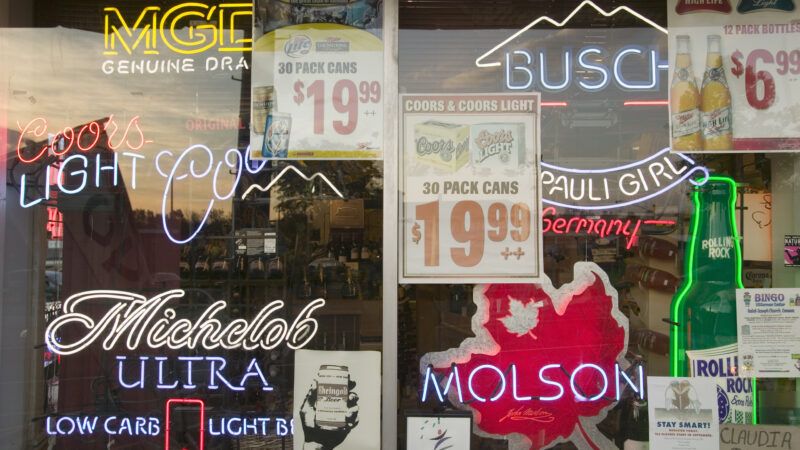Study: If You Let People Buy Beer at Grocery Stores, the Liquor Stores Still Survive
Liquor store owners and store association lobbyists claimed that allowing alcohol sales on Sunday would negatively impact their livelihoods.

Repealing "blue laws" and allowing Sunday alcohol sales has much less of a negative effect than doomsayers predicted.
That's according to a new research paper by Cristina Connolly and Alyssa McDonnell of the University of Connecticut, Marcello Graziano of the Norwegian University of Science and Technology, and Sandro Steinbach of North Dakota State University. The study, published in the Journal of Wine Economics by Cambridge University Press, "examine[d] the impact of repealing Sunday blue laws on alcohol sales and retail competition, focusing on Connecticut's 2012 policy change allowing Sunday beer sales in grocery stores."
Connecticut repealed its long-standing prohibition on Sunday alcohol sales in 2012—more than a century after the law was introduced and three decades after the Connecticut Supreme Court deemed most of the state's other Sunday sales prohibitions unconstitutional. Liquor stores would also be allowed to open on Sundays, in addition to letting grocery stores sell beer on that day.
The repeal of blue laws is not without its critics. According to the Massachusetts Institute of Technology's MIT Tech Talk newspaper, a 2008 study found that "repealing America's blue laws not only decreased church attendance, donations and spending, but it also led to a rise in alcohol and drug use among people who had been religious."
Connecticut's repeal was opposed at the time by liquor store owners themselves, who expressed concern about everything from the "social costs" of more alcohol sales to the extra expense incurred from being open an extra day.
"Proprietors of liquor stores in Connecticut and store association lobbyists claimed that allowing Sunday sales would negatively impact their livelihoods," write the authors of the new study. "Not only would they need to pay operating costs for an extra day of the week, but there was also a concern that consumers would shift to purchasing beer at grocery stores as Sunday is one of the most popular grocery shopping days. Specifically, Connecticut's liquor store association claimed that, as a direct result of this policy, liquor stores would lose sales and reduce employment, or close."
The authors examined Connecticut's sales figures for grocery and liquor stores both before and after the repeal, using other states without Sunday alcohol laws as a control group. They found "no evidence of negative impacts on beer sales in liquor stores."
"Despite repeated claims by liquor store associations," the report concludes, "repealing these laws did not harm liquor stores, suggesting that it is possible to repeal Sunday blue laws without negatively impacting smaller businesses." Incidentally, the study also contradicted claims by grocery store lobbyists, who said Sunday alcohol sales would "have large, positive economic impacts."
The same data also provides comfort for those who worry that being able to buy alcohol one additional day per week would lead to an explosion in alcoholism and addiction. "Our estimates indicate that repealing these laws significantly increased beer sales at grocery and liquor stores directly after the policy shift, but these effects disappeared afterward."
"There is an initial bump in sales, possibly due to the novelty of the policy," they found. "This impact levels off after the initial month, with no discernible effect on sales after the seventh week."
As it turns out, the repeal benefited both consumers and vendors while proving the doomsayers wrong. But it was also a net positive for economic liberty as another piece of Prohibition falls by the wayside.


Show Comments (61)